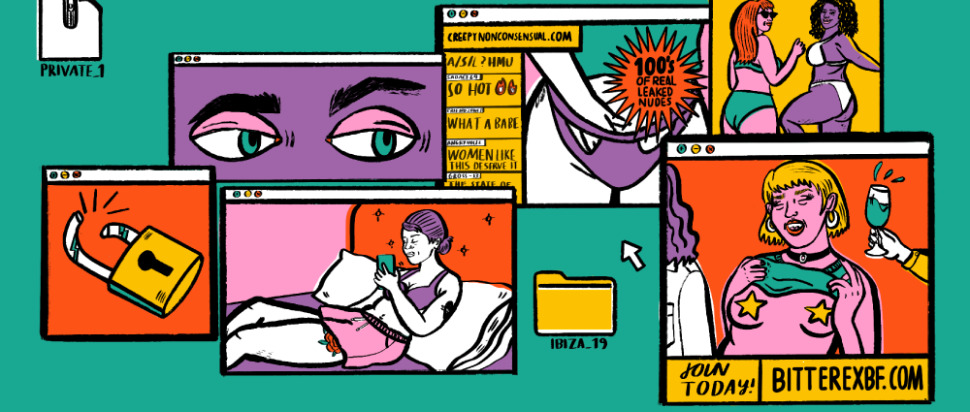Revenge porn, and trust in the age of nudes
After finding images of herself on a revenge porn website, one writer contemplates how we can trust in the age of online dating and "send nudes"
“oh fuck, shes hot. bikini? nudes?”
That was just one of the tamer comments that littered the revenge porn thread I found myself on a few weeks ago. I’d been sent the link by a friend and when I followed it, I found myself scrolling through a website saturated with girls’ images, both sexually explicit and fully-clothed. Over a six-month period, my images had been posted regularly – all fully clothed, taken from my social media and most with my name, location and age attached. Each image had replies commenting on my weight, detailing what they’d like to do me and always requesting that someone provided more. I felt sick.
So-called “revenge porn threads” have become rampant in the last few years, from the notorious Anon-IB, connected to the huge iCloud leak of celebrity nude photos back in 2014, to lesser known strains operating in a similar manner. In these threads, individuals trade images of women paired with information that makes them easy to identify. The users of this site operate under a veil of total anonymity, something that makes the situation even more disconcerting.
When Ams found that paid-for content from her OnlyFans account was being shared in a similar thread, she believed she was targeted specifically for being a sex worker. “I got sent the link to the thread multiple times by different people. I was pretty pissed, but I realised it was older content or screenshots of my page, some paid-for content was distributed but I felt prepared for it to happen to me one day,” Ams told me. “That website loves to target sex workers, so it wasn’t entirely shocking.
“I know I have to be very wary now: I send my terms and conditions religiously, I never do any business that’s not on OnlyFans and I watermark my stuff,” she explains. “The website is no help, you can send them emails all you want but it gets you nowhere so I don’t waste my time anymore.”
Image-based sexual violence often goes hand-in-hand with a rhetoric that blames victims for taking and sharing the pictures in the first place. Yet, for many, sending nude images has become a fundamental part of love in the digital age. For people who use dating apps or social media to find partners, the term “send nudes” is such second nature that it’s become immortalised in online culture as a meme. The act of sending a naked image isn’t taboo – it’s become a part of the seduction process.
For Holly, sharing nude images with a partner was an important part of expressing being comfortable with that person. Unfortunately, they endured two experiences with revenge porn: the first, in a thread similar to the one I was shared on, and the second from an ex-partner.
“A girl had taken a photo of me being daft and exposing myself at a party and shared it on her Snapchat. It ended up being screenshot and posted anonymously in a thread,” explains Holly. “It was awful, but I was more mortified that something that was just a silly photo of me and my friends became twisted into a sexual subject when I was 15.”
“I had a more personal experience a few months after I split up with my ex," says Holly. "He showed his bandmates a video he had on his phone of us having sex when he was drunk. When I found out about that, I had a panic attack.” For Holly, the experience of enduring two instances of image-based sexual violence distorted their perception of sharing images of their own body. “There’s no medium ground; I’m completely private or I put myself out there so advantage can't be taken. I feel like no one would care if I had a smooth genital-less mound – there are people who would still find a way to objectify me no matter what, as a way of ‘putting me in my place.’”
The Abusive Behaviour and Sexual Harm (Scotland) Act came into effect in 2016, making it an offence to disclose, or threaten to disclose, intimate images or videos of people without their consent. People convicted of sharing intimate images without consent could face up to five years in prison. But as rife as these threads are, they operate as global websites and are unlikely to be prosecuted under such laws.
The goal of image-based sexual violence is to tell its victims that they have no control over their own body. That message is only reinforced when the perpetrator operates anonymously, often untraceable and safe from the very legal powers which have been put in place to protect their victims.
Watching my image and personal information be shared for months without my consent in such a disconcerting context has left me feeling anxious about how I present myself online. It’s an anxiety mirrored in the thousands of faces that filled those websites alongside mine. All with our privacy invaded and all instilled with the message that online, our bodies aren’t our own.
For more information and support on this topic, visit revengepornhelpline.org.uk
